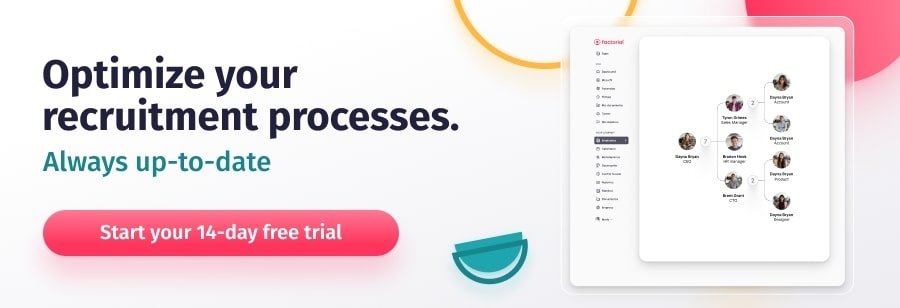In this article, we’ll explore roles and responsibilities of a recruiting manager.
Recruitment is your business’s most important strategy. To execute their mission and reach their objectives, organizations must first employ the right people. In today’s knowledge-based and innovation-driven economy, most businesses consider human capital their most important asset. This is why recruiting managers are so important: they secure the top talent that ensures a business’s success.
A lot depends on the effectiveness of a hiring manager. In order to create a cost- and time-efficient hiring process, these managers must be creative, proactive, and focused. Here is how you can write the perfect job description to hire an excellent recruiting manager.
Definition: Recruiting Manager
Broadly, a recruiting manager helps people find jobs and jobs find people.
These managers lead teams of HR recruiters. They are responsible for designing a recruitment process that is faithful to the organization’s hiring strategy. They also implement company hiring policies that encourage employee diversity and identify strategies to find candidates who will fit the company culture. As ambassadors to possible new hires, recruiting managers help to optimize and promote the employer’s brand.
To be an effective hiring manager, you must be familiar with the talent landscape. You should be proactive in drawing candidates’ initial interest. After that, rely on strong interviewing skills and good judgment to find the perfect match. Hiring manager interview training may help prepare you for this role.
Key Traits of a Successful Hiring Manager
What qualities make a successful recruiting manager? Someone making vital hiring decisions for any company must have strong hard and soft skills. Here are three traits that make a hiring manager shine:
- Knowledgeability: A recruitment manager needs to have a broad base of knowledge. You should be familiar with local and federal labor laws that may affect your company’s hiring processes. Also read up on the company’s history, mission, and direction. You will need to represent these values to potential hires. Proficiency in an applicant tracking system is a must.
- Resourcefulness: In order to tap into talent pools, recruiting managers need to be creative. You should always be on the lookout for new strategies and outreach avenues. Critical thinking and problem-solving skills will help to further smooth the hiring process.
- Interpersonal skills: Recruiting managers must liaise with many different people. You talk with executives, HR recruiters and staff, and potential candidates. Most importantly, you are responsible for conveying the company’s culture to the world. Maybe it goes without saying that a recruiting manager has excellent interpersonal skills– but these managers prioritize clear communication, so we’ll say it anyway.
Top 5 Recruiting Manager Duties
Recruiting operations managers must design, create, and direct hiring processes. To do so, they work closely with management to establish hiring goals and help their team to meet them. Here are the key responsibilities involved:
-
Research and update recruitment procedures
Make sure recruitment processes reflect a broader hiring strategy. It is also important to stay up-to-date on labor legislation and adjust the hiring approach as necessary. Will your company be using blind resumes to avoid unconscious bias? Do you have a hiring process checklist that needs to be followed?
-
Evaluate and suggest the best applicant tracking systems (ATS)
Behind every successful recruiting manager is the recruitment software they use to manage the interview process. Invest in software that will manage candidates through the hiring process, saving your team time and resources.
-
Forecast future hiring needs
Use data analytics to stay on top of current vacancies and potential openings in order to minimize the costs of an unfilled position.
-
Liaise with the executive team to establish recruitment goals
Establish clear recruitment guidelines that are in line with corporate goals. Do new positions need to be created to fill gaps in your changing company? It is up the recruiting manager to determine if the company should pursue internal or external recruiting. Similarly, a hiring manager will have insight into overstaffing or understaffing problems.
-
Recommend ways to optimize and showcase employer brand
Audit the employer brand to determine how it aligns with company culture. As a company ambassador, it is your job to find new platforms and methods for conveying company values.
What is the Standard Recruiting Manager Salary?
How much do hiring managers make? According to Indeed’s article on recruitment manager salaries, the average recruiting manager salary is $74,202 yearly. However, this will vary according to your experience, the size of the company, and of the team working beneath you.
In the end, if your salary isn’t market rate, it may be time to talk to your supervisor for a rise or scope out open positions elsewhere.
How to Write a Great Recruiting Manager Job Description
The first step of the recruitment process may be the most important. A well-written and appealing job description will help pique the interest of talented employees. When looking for a recruiting manager, keep these tips in mind.
- Start with a short, engaging overview of the job. Firstly, get things off on the right foot with a few sentences about the job’s major function and its relationship to larger company objectives. Use this as an opportunity to invite applicants to “improve peoples’ lives” or address social problems.
- Avoid superlatives or extreme modifiers. We know you are excited but over-the-top language like “world-class,” “rockstars,” or “off the charts” may prevent more humble candidates from applying. Instead, use language which points to the growth process. Seek “perfectionists” and “enthusiasts.”
- Focus responsibilities on growth and development. You don’t have to include every single responsibility a new employee will have. Those long bulleted lists can be difficult to absorb! Instead, focus on five to seven key functions. Draw attention to how this role contributes to the larger mission of the company.
- Emphasize Culture. Candidates want to feel that they will enjoy working at a company. Highlighting workplace benefits, perks, and workplace bonuses may help convince applicants that the company takes employee satisfaction seriously.
- Remove Gendered Language. Studies show gendered language in an advertisement can deter highly-qualified applicants from applying. So keeping your post gender-neutral will help you find more talented applicants more quickly.
- Double & Triple Check. Lastly, nothing will turn off a potential candidate more than a few typos sprinkled in the job description. Check it once and then check it again! In short, be as detail-oriented as you hope the new hire will be.
A great job description will lead to a more fruitful interview.
Hiring Managers vs. Recruiting Managers
A recruiter manager may either be a part of company’s HR department or an external contractor. Recruiters source candidates and conduct initial interviews for open positions.
A hiring manager is the team lead looking to fill an open position. This will be the manager the new hire ultimately reports to on a regular basis. The hiring manager signs the offer letter and closes the deal when it comes to new hires.
Recruiting managers must work closely with hiring managers so that they can source candidates that not only fit the company’s criteria, but also the more specific needs of a particular team.
What Are Hiring Managers Looking For?
Recruiting managers have a responsibility to find the best employee to meet the needs of hiring managers. While the exact checklist will vary by position, there are some qualities that are universally appreciated. Recruiters are always looking out for the following:
- Informed: Recruiting managers want an applicant who is well-researched, and who already knows something about the position and the company they are interviewing for.
- Relevant qualifications and soft skills: What are hiring managers looking for in a resume? They want to see that you have the hard skills (e.x. proficiency with programming, writing) and soft skills (e.x. communication, problem-solving) to get the job done.
- Good fit with the organization’s culture and values: Is the applicant a good fit for this particular company? Are they excited about its mission and purpose?
- Engaged: Recruiters certainly want to find employees who are as excited about the position as they are. For instance, applicants shouldn’t be afraid to send a message to a hiring manager after the interview with follow-up questions or a simple thank you. Recruiters will appreciate the candidate’s interest.
What Recruiters, Hiring Managers, and Candidates Need to Unlearn
In the current climate, the way that we go about hiring is changing, fast. Organizations no longer ask candidates “Why should we hire you?” Instead, they need to be asking, “Why are we a good fit for each other?”
This change in mindset is part of a larger recruiting trend which is reshaping our society. Learn how recruiting managers can change their attitudes, learn new skills, and hire more effectively in our podcast with boutique recruiting firm East Side Staffing’s founder and CEO Laura Mazzullo.
Recruitment Management System
Great leaders make management look easy. But it takes time, practice, and plenty of technology to thrive. The secret to success is finding an applicant tracking software (ATS) that works for you.
An ATS will help recruiting managers every step of the way. Integrated software allows you to post jobs directly on portals like LinkedIn, Indeed, and Glassdoor. You can also customize your own career page.
Factorial aggregates all relevant employee information in one place, tracks candidate interviews, and makes for a seamless transition into the onboarding processes.
To sum up, businesses that prioritize talent acquisition succeed. It is up to recruiting managers to design an efficient recruitment process to build an effective workforce.
Recruiting is easier with Factorial’s applicant tracking software. Try it as part of our 14-day free trial today.




